Statue of Unity shall always be India’s pride
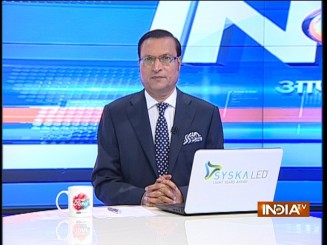 On Wednesday night, in my show Aaj Ki Baat, India TV for the first time unveiled the first look of the statue of Sardar Vallabhbhai Patel, which will be dedicated to the nation by Prime Minister Narendra Modi on the 143rd birth anniversary of The Iron Man of India on October 31.
On Wednesday night, in my show Aaj Ki Baat, India TV for the first time unveiled the first look of the statue of Sardar Vallabhbhai Patel, which will be dedicated to the nation by Prime Minister Narendra Modi on the 143rd birth anniversary of The Iron Man of India on October 31.
Named Statue of Unity, it is 182 metres (597 feet) tall from the plinth level and 240 metres tall from the river base of Narmada. It faces the Narmada Dam. It is located on a river island Sadhu Bet near Vadodara. Spread over 20,000 sq. metre of project area, the statue will be surrounded by a huge artificial lake.
This is the tallest statue in the world, taller than the tallest one presently, Spring Temple Buddha, in China, which is 128 metres tall. Modi had laid the foundation of the Statue of Unity five years ago, on October 31, 2013, when he was the Chief Minister of Gujarat. This shows the visionary approach of Prime Minister Modi, who insisted on sticking to the schedule.
Vallabhbhai Patel was India’s first Deputy Prime Minister and Home Minister, and one of the chief disciples of Mahatma Gandhi. He led the satyagraha in Bardoli, after which he earned the nickname Sardar. Soon after Independence in 1947, Sardar Patel with his diplomatic skills and foresightedness brought about the merger of 565 princely states in the Indian Union. The Statue of Unity is a befitting gift to the people of India in memory of the Iron Man.
Sardar Patel was one of foremost leaders of Congress party. Before independence, most of the state units of Congress party wanted Patel to become the Prime Minister, but the mantle ultimately fell on Jawaharlal Nehru.
After his death, the Congress party did not give him due honour. The Bharat Ratna was bestowed on him posthumously in 1991, 41 years after his death in 1950. The Statue of Unity shall eternally stand as a symbol of the great contribution made by Sardar Patel, who has also been described as the Bismarck of India.
Click Here to Watch Full Video | Get connected on Twitter, Instagram & Facebook
Like his son, Alpesh Thakor should also think about children of migrants fleeing Gujarat
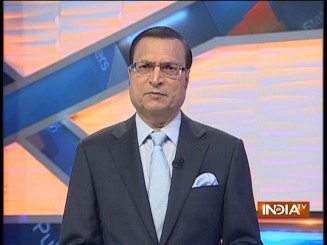 Gujarat Congress MLA and Kshatriya Thakor Sena leader Alpesh Thakor on Tuesday became emotional after fingers were pointed at him in the wake of hate attacks against labourers from UP and Bihar. Alpesh Thakor said that his son was down with dengue and was on the sick bed. It is true that Alpesh’s son had a very low platelet count of 28,000 which fell to 13,000 on Tuesday. The child’s condition is serious and our prayers are with him, so that he recovers soon and returns home from hospital.
Gujarat Congress MLA and Kshatriya Thakor Sena leader Alpesh Thakor on Tuesday became emotional after fingers were pointed at him in the wake of hate attacks against labourers from UP and Bihar. Alpesh Thakor said that his son was down with dengue and was on the sick bed. It is true that Alpesh’s son had a very low platelet count of 28,000 which fell to 13,000 on Tuesday. The child’s condition is serious and our prayers are with him, so that he recovers soon and returns home from hospital.
This is now the time for Alpesh to introspect. If he is so much concerned about his son’s health, he should also be concerned about the children of migrant labourers fleeing Gujarat in panic because of hate attacks by supporters of his Sena.
Alpesh had given provocative speeches in which he had called for “weeding out the bushes” that have grown up in Gujarat. These “bushes” (migrant labourers) are also human beings and they have families to look after. They have given their blood and sweat in return for wages to build industries in Gujarat. They too are Indians, and Alpesh, in order to garner support from his community, had been spreading hate against Hindi-speaking labourers.
According to the 2011 census, Gujarat’s poulation was six crore three lakhs, out of which two crore 69 lakhs are migrants, who have settled there after migrating from other states. Seventy per cent of workers in Gujarat’s industries are North Indians. More than 15 lakh labourers from UP and Bihar live and work in Surat, Valsad and Navsari. The population of the city of Surat is roughly 55 lakhs, out of which 30 lakhs are migrants.
Those who are spreading hate in Gujarat should understand that if the migrant workforce leaves, it will badly affect the state’s economy. Gujarat is India’s leading developed state, and a major exodus of migrant labourers will harm the interests of Gujaratis too.
Click Here to Watch Full Video | Get connected on Twitter, Instagram & Facebook
The unfortunate exodus of Bihar and UP labourers from Gujarat
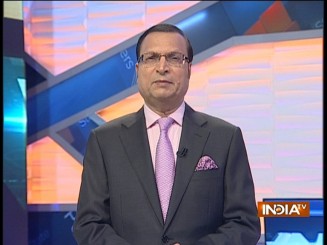 More than 15,000 migrant workers from Bihar and Uttar Pradesh have fled Gujarat so far in an exodus triggered by hate attacks following the rape of a 14-month old girl belonging to Thakor caste in Sabarkantha, Gujarat. Workers from Bihar and UP have been threatened by local goons belonging to Thakor Sena to leave the state, and in several cases, innocent labourers have been thrashed leading to the exodus.
More than 15,000 migrant workers from Bihar and Uttar Pradesh have fled Gujarat so far in an exodus triggered by hate attacks following the rape of a 14-month old girl belonging to Thakor caste in Sabarkantha, Gujarat. Workers from Bihar and UP have been threatened by local goons belonging to Thakor Sena to leave the state, and in several cases, innocent labourers have been thrashed leading to the exodus.
The exodus has resulted in tremendous financial loss to local industries, particularly ceramic, where migrant labourers have been working. Workers from Hindi-speaking states used to get good wages in these factories, and these people were the real ambassadors for Gujarat. They used to spread the message in Bihar and UP about how peaceful the state of Gujarat was, and how they were getting good remuneration for their work.
A handful of leaders, in order to score political points, spoiled the peaceful atmosphere. These leaders are enemies of society. Congress MLA Alpesh Thakore, in his new ‘avatar’ as a Thakore community leader may give any number of excuses to say that the video portraying him to be making provocative speeches, was of a meeting which took place 20 days before the rape incident. His arguments may be correct, but because of such provocative speeches, an atmosphere of hate was created, and the child rape incident added fuel to fire. Supporters of Alpesh Thakore exacerbated the situation by thrashing innocent labourers from Bihar and UP, giving rise to the exodus.
I would like to appeal to all sections of society in Gujarat, Bihar and UP to calm down and help in bringing back normalcy in Gujarat. Parochialism will not solve any problem.
Click Here to Watch Full Video | Get connected on Twitter, Instagram & Facebook
VHP saints have put the Centre in a fix over Ram temple
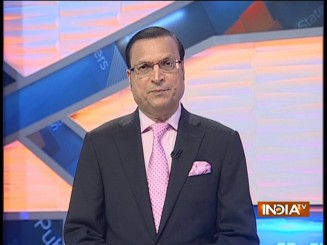 A high-powered committee of saints belonging to Vishwa Hindu Parishad on Friday issued an ultimatum to Centre to enact a legislation to build a Ram temple at the disputed site in Ayodhya by January 31. The saints said they were unwilling to wait any more for the Supreme Court to give its verdict on Ayodhya title suit, and would go ahead with laying the foundation of the temple. The saints decided to hold mass rallies across India next month, and this will be followed by presenting petitions to Governors at state capitals.
A high-powered committee of saints belonging to Vishwa Hindu Parishad on Friday issued an ultimatum to Centre to enact a legislation to build a Ram temple at the disputed site in Ayodhya by January 31. The saints said they were unwilling to wait any more for the Supreme Court to give its verdict on Ayodhya title suit, and would go ahead with laying the foundation of the temple. The saints decided to hold mass rallies across India next month, and this will be followed by presenting petitions to Governors at state capitals.
The Supreme Court will begin hearing in the Ayodhya case from October 29 onwards, and it is expected that the hearing will take place at a fast pace, and a verdict is expected at the earliest. Secondly, eight years ago, the Allahabad High Court had given its verdict on the dispute site, where the Babri mosque wias built during the Mughal period after demolishing a temple. The High Court had even divided the disputed land among Hindus and Muslims. The present case pending before the apex court relates to the title suit.
The sooner the apex court’s verdict comes, the better. Politicking over this issue will continue even after the apex court gives its verdict. Already the opposition is levelling charges that the temple issue is being brought to centrestage in the wake of forthcoming assembly polls in MP, Rajasthan, Chhattisgarh and Telangana, and next year’s Lok Sabha polls. The BJP’s stand has been that since the matter is already before the apex court, it cannot bring a legislation on an issue that is sub judice.
The argument put forth by the VHP saints is that if the government can bring an ordinance to enforce ban on triple talaq, why can’t it bring a legislation to build the Ram temple on the disputed site. If the Supreme Court’s order on SC, ST atrocities act can be overruled by enacting a legislation, why can’t the Centre bring law to build the Ram temple, which the Hindu masses really want.
Click Here to Watch Full Video | Get connected on Twitter, Instagram & Facebook
Bringing fuel products under GST can be a durable solution
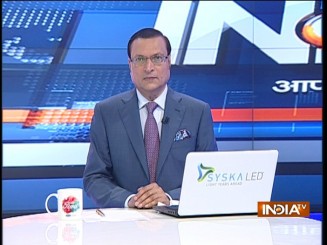 On Thursday, Finance Minister Arun Jaitley announced a Rs. 1.50/iitre cut in central excise duty, while oil marketing companies cut their prices by Re 1/litre, thereby ensuring a Rs 2.50/litre reduction in fuel prices.
On Thursday, Finance Minister Arun Jaitley announced a Rs. 1.50/iitre cut in central excise duty, while oil marketing companies cut their prices by Re 1/litre, thereby ensuring a Rs 2.50/litre reduction in fuel prices.
Jaitley appealed to all state governments to reduce VAT on petroleum products by Rs 2.50/litre. Most of the BJP-ruled governments promptly reduced VAT, thereby providing an overall relief of Rs 5/litre on petroleum products. However, the state governments in Karnataka, West Bengal and Kerala refused to reduce VAT, meaning that petrol and diesel in these states will be costlier.
It is true that international crude prices continue to rise because of US sanctions against Iran and the OPEC countries reducing their oil output, resulting in a demand-supply mismatch. Moreover, the US-China trade war is impacting the economy of many countries in the world.
The Indian Rupee continues to slide and on Thursday, it touched a low of Rs 73.81/US dollar. The Sensex also fell 806 points to close at 35,200. All these factors can cause serious harm to our economy, but Jaitley has expressed confidence that basic parameters of our economy are strong and stable. Even if European and Southeast Asian countries face problems, the Indian economy can survive through this turmoil. But if crude prices continue to rise, the effect of Thursday’s cut of Rs 5/litre can last only for two weeks. In 10-15 days, the prices of petrol and diesel will be back to the same level.
Under present circumstances, the only way to lower fuel prices is to bring all petroleum commodities under GST. This will reduce oil prices, and at least there will be uniformity in fuel prices across the country.
Click Here to Watch Full Video | Get connected on Twitter, Instagram & Facebook
Mayawati’s decision to go alone in MP, Rajasthan will definitely impact opposition unity efforts
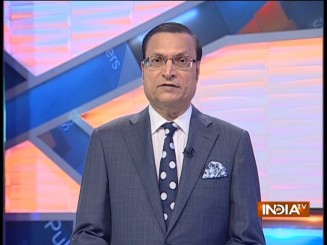 Bahujan Samaj Party supremo Mayawati on Wednesday threw a political bombshell by announcing that her party will have no tie-up with the Congress in the assembly polls in Madhya Pradesh and Rajasthan. Her party had earlier announced a tie-up with the breakaway Congress led by Ajit Jogi. Mayawati targeted senior Congress leader Digvijaya Singh, describing him as a “BJP agent”, and alleged that he has sabotaged the tie-up offers. The BSP leader alleged that Digvijaya Singh was not in favour of an aliance between Congress and BSP in Madhya Pradesh, and he had been giving statements that she was working under pressure from Centre.
Bahujan Samaj Party supremo Mayawati on Wednesday threw a political bombshell by announcing that her party will have no tie-up with the Congress in the assembly polls in Madhya Pradesh and Rajasthan. Her party had earlier announced a tie-up with the breakaway Congress led by Ajit Jogi. Mayawati targeted senior Congress leader Digvijaya Singh, describing him as a “BJP agent”, and alleged that he has sabotaged the tie-up offers. The BSP leader alleged that Digvijaya Singh was not in favour of an aliance between Congress and BSP in Madhya Pradesh, and he had been giving statements that she was working under pressure from Centre.
Mayawati’s decision has come as a big setback for the proposed ‘mahagathbandhan’ (grand alliance) of non-BJP parties for the coming assembly polls and next year’s Lok Sabha polls. The BSP had come into the limelight early this year, when in a tie-up with Samajwadi party, she lent her party’s full support to SP, to inflict a crushing defeat to BJP in the key LS byelections in Gorakhpur and Phulpur.
The SP-BSP tie-up was the harbinger of the move to form a ‘mahagathbandhan’ in the forthcoming assembly polls and LS elections. Surveys were conducted in Madhya Pradesh, Rajasthan and Chhattisgarh, in which it was predicted that the Congress could defeat the BJP in these states, only if there was a tie-up with the BSP. Mayawati was the strong link in the chain that was expected to forge the ‘mahagathbandhan’, but with Wednesday’s announcement, a big fissure has taken place in opposition unity, and this is bound to have consequences on the political equations for next year’s Lok Sabha polls.
Click Here to Watch Full Video | Get connected on Twitter, Instagram & Facebook
Farmers should refrain from violence while pressing their demands
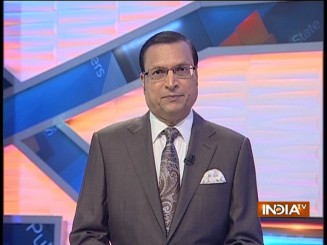 An estimated 25,000 farmers have staged a sit-in on Delhi-UP border at Ghaziabad since early Tuesday morning with a long list of demands. The Centre has agreed to most of their demands, which include filing a review petition against National Green Tribunal order banning 10-year-old diesel vehicles, including tractors, inside National Capital Region, asking GST Council to consider lowering prices of agricultural equipment, forming a panel on making insurance applicable to all crops and premium to be paid by government. The standoff is over the pending demands like waiving off farmers’ loan, reducing diesel price for agricultural purpose, providing free electricity for tubewells, and granting monthly pension of Rs 5,000 to small and marginal farmers aged 60 and above.
An estimated 25,000 farmers have staged a sit-in on Delhi-UP border at Ghaziabad since early Tuesday morning with a long list of demands. The Centre has agreed to most of their demands, which include filing a review petition against National Green Tribunal order banning 10-year-old diesel vehicles, including tractors, inside National Capital Region, asking GST Council to consider lowering prices of agricultural equipment, forming a panel on making insurance applicable to all crops and premium to be paid by government. The standoff is over the pending demands like waiving off farmers’ loan, reducing diesel price for agricultural purpose, providing free electricity for tubewells, and granting monthly pension of Rs 5,000 to small and marginal farmers aged 60 and above.
The farmers have come prepared for a long haul. They have come in tractors loaded with foodstuff. They have staged a sit-in on NH-24 near Ghaziabad waiting to be allowed into the capital. On Tuesday, they clashed with police leaving several of them injured.
The farmers’ demands may be genuine. They have the democratic right to stage protests, but the visuals of Tuesday’s protests show a different picture. Some of the protesters used tractors to ram into barricades, and threw stones at the police. Such incidents could have taken a big toll, but it goes to the credit of police that they practised restraint, and resorted to lathi charge and teargas to disperse the protesters. Nobody will support such violent tactics.
I would also request daily commuters on this route to use alternate means to commute between Ghaziabad, Meerut and Delhi. Let’s hope good sense prevail on the protesters and the sit-in is called off soon.
Click Here to Watch Full Video | Get connected on Twitter, Instagram & Facebook
Delhi Police Commissioner must take stern action against policemen conniving with drug peddlers
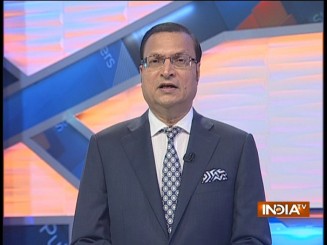 The normally quiet locality of Taimoor Nagar in southeast Delhi has become a flashpoint after the daylight murder of an anti-drugs activist Rupesh by suspected drug peddlers. He was shot at point blank range while he was playing cricket with teenagers. The local police did not cooperate when residents went to a PCR standing at a distance, but instead of helping, the policemen sitting inside the PCR fled from the spot.
The normally quiet locality of Taimoor Nagar in southeast Delhi has become a flashpoint after the daylight murder of an anti-drugs activist Rupesh by suspected drug peddlers. He was shot at point blank range while he was playing cricket with teenagers. The local police did not cooperate when residents went to a PCR standing at a distance, but instead of helping, the policemen sitting inside the PCR fled from the spot.
Angry residents smashed and burnt cars, and indulging in stoning. Local residents have alleged that some policemen have been conniving with drug peddlers in the locality. Even on Monday, two drug peddlers were caught with narcotics by local people and handed over to police, but they were allowed to escape. The most striking fact is that the unauthorised slums built forcibly on Delhi Police land have now become a den for drug peddlers, and yet the police has turned a Nelson’s eye.
The point I want to make is this: Taimoor Nagar is not a locality far away from the centre of power. It is located hardly 3 km away from AIIMS and 2 km from Nizamuddin railway station. Nobody can claim that police have no knowledge about the dubious trade that is going on. Local residents had complained to police several times about drug peddlers, but no action was taken. This is totally unacceptable.
The Delhi Police Commissioner must play a pro-active role and take stern action against those policemen who are working in connivance with the drug peddlers. These corrupt policemen should be identified and dismissed from service.
Click Here to Watch Full Video | Get connected on Twitter, Instagram & Facebook